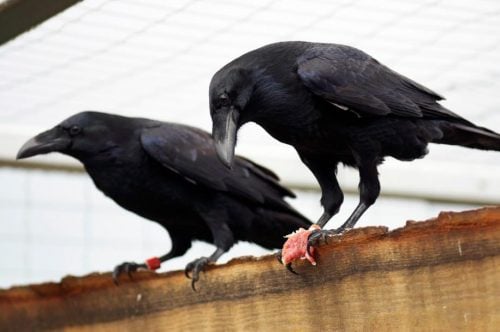By getting them to solve problems not found in nature, scientists have shown that ravens can plan ahead to a certain extent, an ability that was thought to be confined to humans and the great apes.
In a recently published Science study, two cognitive science researchers from Lund University in Sweden describe a series of experiments where they showed that ravens can plan ahead.
 The researchers showed that ravens can plan ahead as well as the great apes. Credit: Mathias Osvath
The researchers showed that ravens can plan ahead as well as the great apes. Credit: Mathias Osvath
They showed that ravens (Corvus corax) have the ability to forego an immediate small food reward if there is an option to select a tool that they can use to obtain a larger amount of food many hours later.
Smarter than food hoarding
Previous studies have already shown that corvids, that is members of the crow family, are capable of what appears to be forward planning in that they stash food for the next day in different places.
However, this “clever” propensity to hide food might just be a behavioural adaptation that only occurs in the specific domain of food hoarding.
Other experiments have shown that apes can go beyond such adaptation behaviour and plan ahead across domains, what the Lund researchers, cognitive biologists Can Kabadayi and Mathias Osvath, refer to as “general planning” ability.
‘As capable as apes’
Kabadayi and Osvath believe that their new study shows that ravens can plan ahead as well as apes in tasks that require general planning.
They got their lab-dwelling ravens to solve tasks that require them to use tools and barter with humans.
These two behaviours are not part of the raven’s adaptation repertoire: they do not require them for tasks that they naturally come across in the wild. In this sense, they differ from other corvids – such as crows – which do use tools and barter with each other.
The researchers say that another reason for choosing tasks that require tool use and bartering with humans is that they have been tested on apes and thus give a good basis for comparing the results from the tests on ravens.
Choose a tool or a token
To show that ravens can plan ahead, Kabadayi and Osvath ran several experiments where the birds could either choose a tool or a token from among a variety of objects. If they chose a tool or a token they could use either one to solve a future problem at a different place.
Previous to these tests, the researchers had already taught the birds how to use a tool to open the box with food in it (see the video below). The ravens had also learned that if they traded the tool for a token, they could get an even bigger reward.
The ravens consistently picked the tool that opened the reward box. They did this even if the box was missing, for up to 17 hours.
Kabadayi and Osvath say that the results from the tool-use show that ravens can plan ahead as well as apes, and that they beat the apes in bartering.
Delayed gratification
Kabadayi and Osvath also demonstrated that the ravens were capable of self-control or “delayed gratification.”
They did this with an experiment where they included a small piece of food among the objects that the ravens could choose from (including the tool and bartering tokens).
Most of the birds chose the tool, even though they had to wait to use it to open the box to get a bigger reward.
The study also showed that the ravens weigh up the pros and cons in terms of how long they have to wait to get the bigger reward.
Like humans, they chose to wait 100 percent of the time if their access to the box was only a few seconds, but in experiments where the access was delayed for much longer, they were more likely to choose the immediate reward.
In other words, Osvath says, “When they have a short delay, they are much better at self-control.”
Nathan Emery, a cognitive biologist at the University of London in the United Kingdom was not involved in the research. He told Science Magazine that the study represents the “clearest evidence for future planning in a nonhuman animal.”
Video – Ravens can plan for the future
The following video from Science Magazine summarizes the study’s main findings.
